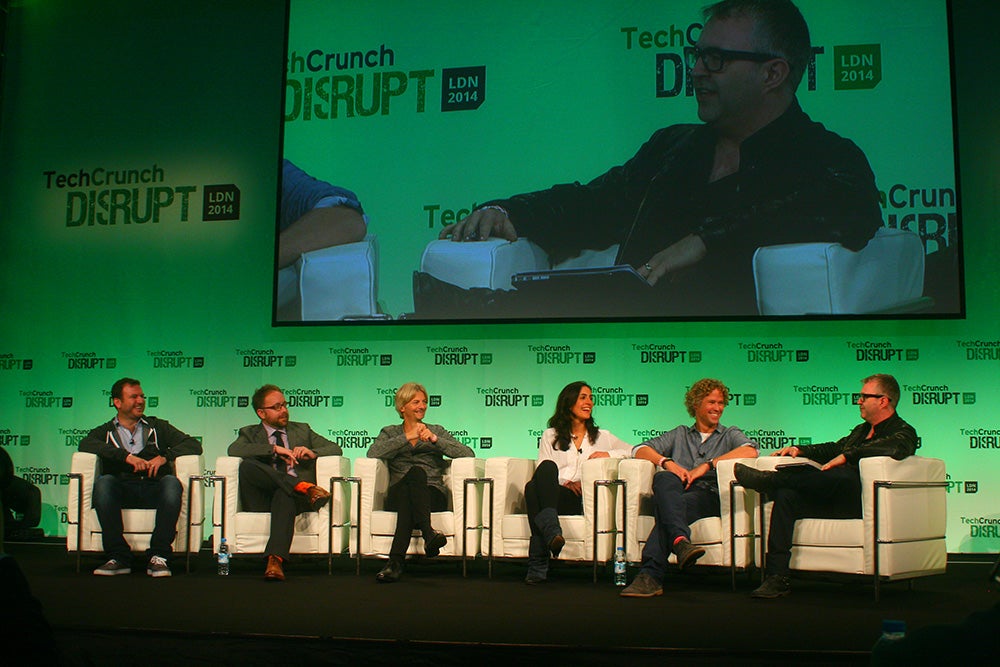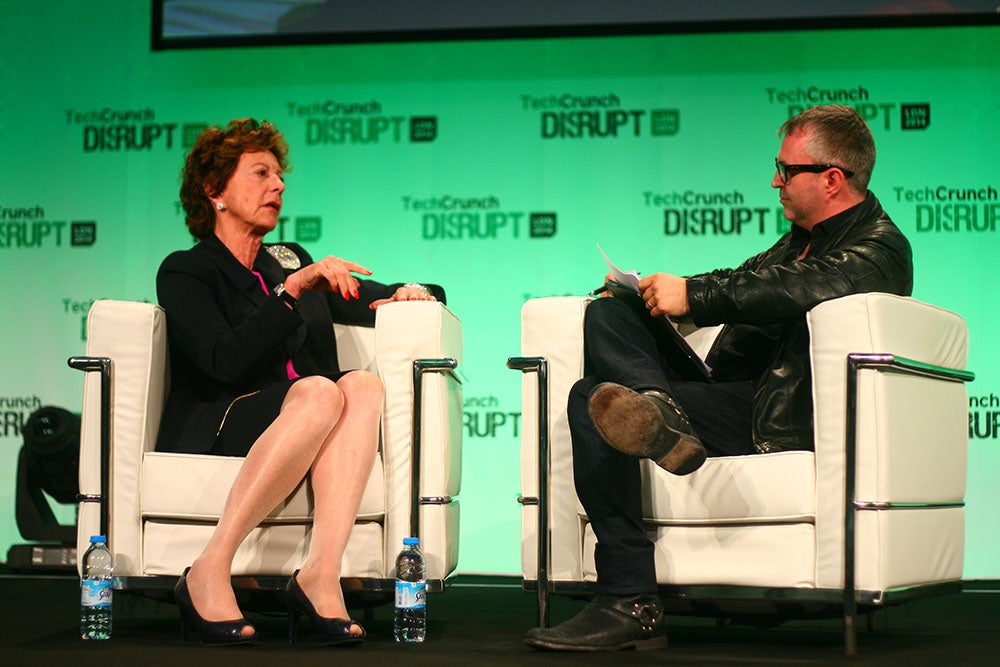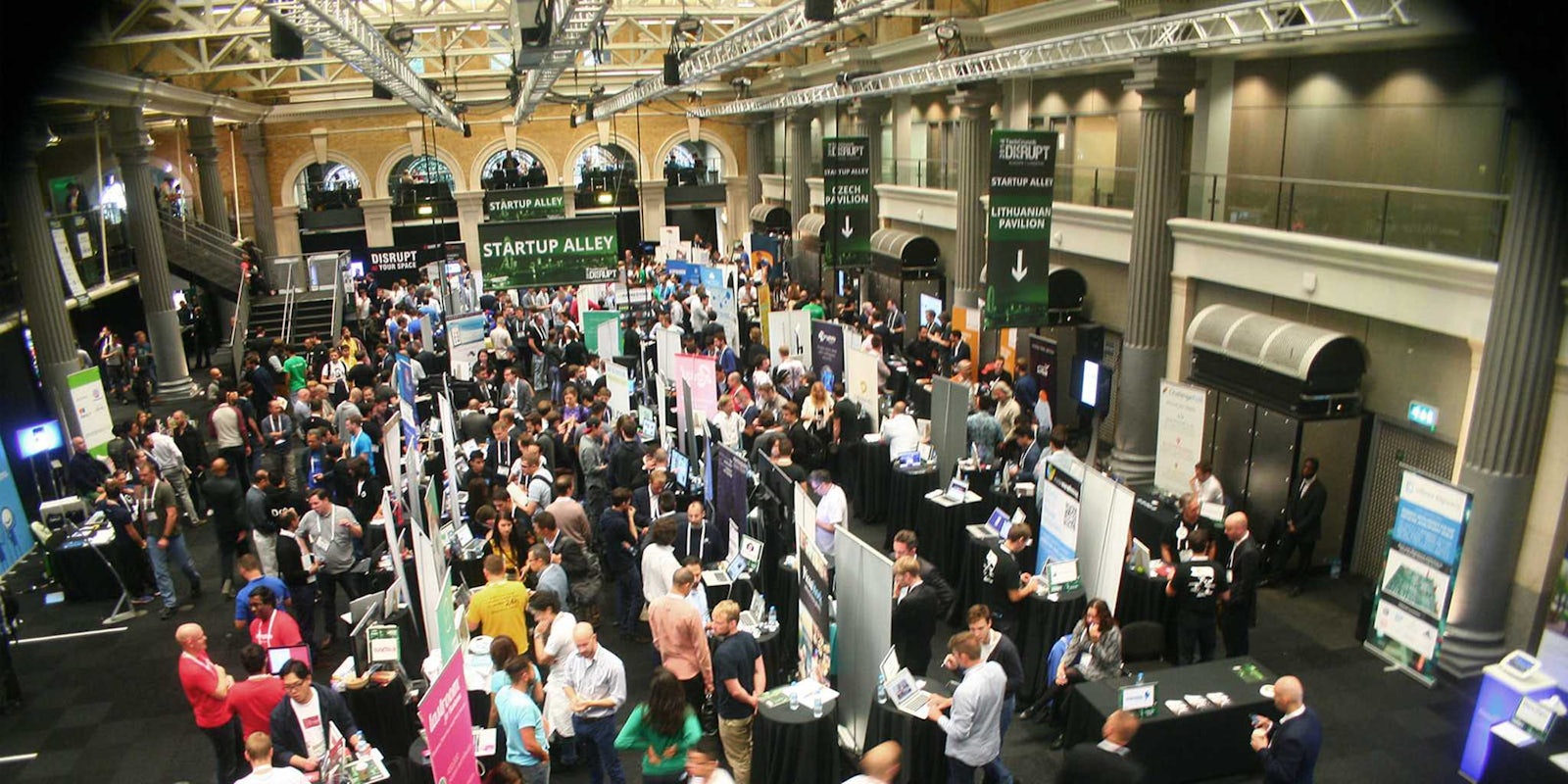Key industry figures have gathered for TechCrunch’s Disrupt Europe conference, held in London. Attendees have been greeted with a celebration of the continent’s rising tech scene, as well as criticism of the EU’s “sclerotic” regulatory regime, which a top European official admits is a “jungle.”
First to the stage were the partners in the newly formed European arm of Google Ventures—itself the single clearest sign of the technology industry’s renewed commitment to the continent. Aiming to bring American-style venture capital funding to Europe, the team is initially headed up by Tom Hulme, Avid Larizadeh, Bill Maris, Peter Read, Eze Vidra, Peter Read, and MG Siegler—Siegler (a former TechCrunch writer) confirming that he is to stay in Europe indefinitely.

(L-R) Eze Vidra, MG Siegler, Peter Read, Avid Larizadeh and Tom Hulme, in conversation with Mike Butcher of TechCrunch. Photo by Rob Price.
“We didn’t want to create a minor league team,” Siegler told the attendees, and though (as TechCrunch notes) the initial $100 million fund is small compared to Google Ventures in the U.S., the project will hopefully be growing further over the coming months, with an emphasis on co-investing and working with the existing venture capital ecosystem.
The European tech scene was also on show—notably with dozens of startups crowding the “Startup Alley,” paying a hefty premium in the hopes of snagging favorable press, a chance at entering the Startup Battlefield, or—most elusively—VC funding.
Rohan Silva, a former British government advisor on technology, singled out London in particular as being the heart of Europe’s technology scene. “There aren’t British entrepreneurs pitching [to venture capitalists] in Milan,” Rohan said—a key reason for this being the tax breaks offered to startups in Britain.
This is the crux of criticism for the European startup scene: Despite hot properties emerging, including Soundcloud, Spotify, and ASOS, panelists pointed to the continent’s tax regime and burdensome “red tape” as being toxic to startup culture. The European Union’s regulatory system can be “sclerotic,” argued Silva, saying that it makes it too hard to “build dynamic, entrepreneurial companies,” and that governments need to respect “wealth creators.”
Europe can be overly protectionist with regards to the U.S., Silva told the Daily Dot, and while proud of his legacy in the government, he is unsure about the tax regimes elsewhere in Europe. France in particular was singled out—the abundance of French entrepreneurs living in London, Silva argued, was evidence that talent will gravitate toward friendly economic ecosystems.
Jason Whitmire of VC firm Earlybird was more critical, claiming that Berlin—one of the continent’s tech hubs—has happened “in spite of the government” rather than because of it. However, Florian Meissner, the Berlin-based CEO of photo-sharing app EyeEm, told the Daily Dot that startups shouldn’t worry about regulatory hurdles starting out, and just go for it: While there are issues with the European model, he admits, they’re principally in relation to immigration, and getting hold of skilled workers.
It’s the issue also identified as key by Silva, who pushes for a joint American-British entrepreneur visa—and it’s also a hot topic across the pond, with Mark Zuckerberg investing heavily in lobby groups calling for reform of American immigration law.
Tine Thygesen of Greenspaces praised Northern Europe’s extremely low levels of corruption, but argued much of the regulation currently facing the tech scene was “made for the situation we had 100 years ago.” Europe should feel compelled to “babysit entrepreneurs,” Thygesen said, but should instead try to focus on “[getting] rid of the stuff that stands in our way—the red tape, the tax problems.”
The comments at Disrupt are fairly reflective of opinions in the larger global tech scene—though the sentiment here is arguably passive compared to some outspoken startup players. Numerous tech giants have been accused of creating convoluted financial arrangements trying to avoid paying tax on the continent; and when Uber was banned in Germany following a court ruling, the taxi platform announced they would simply disregard the ban and keep on operating.
Many of the concerns raised at Disrupt are valid: A joint visa system between the States and Europe could grow both economies, and, as Rohan Silva highlights, European state aid laws can make it difficult for local governments to support the early-stage investment required to grow businesses. But as the full might of the American tech industry makes itself known in Europe, legislators would do well to remember: The interests of entrepreneurs and their startups aren’t always synonymous with those of their citizens.
Neelie Kroes, outgoing European Commissioner for Digital Agenda, later took to the stage to attempt to defend her legacy against, at times, aggressive questioning—allegations that the “right to be forgotten” is a “disaster” being chief among them.
Kroes admitted that the European system could be a “jungle” to entrepreneurs, and that there is more “red tape” to cut through—but that shouldn’t put off native entrepreneurs who should “apply, apply, apply” for the schemes the European Union does offer to startup founders. “Don’t think it’s too difficult for you,” Kroes encouraged, claiming there were also “fairy tales” and misinformation surrounding the state of European regulation.

Neelie Kroes in conversation with Mike Butcher of TechCrunch. Photo by Rob Price.
It’s these same European Union initiatives that were criticized by Jason Whitmire earlier, who warned of a two-speed venture economy, with some funds sustained only by government intervention, in contrast to the entrepreneurial “live and die” attitudes seen on international capital markets.
Kroes’ response to this potential for “parallel universe ecosystems,” state-funded and venture-funded, is that “both are worthwhile,” and that European entrepreneurs still shouldn’t be afraid to embrace failure, and should actively be less risk averse.
Regulatory hurdles or no, the European technology scene is on the rise. Mashable, Business Insider, and Ars Technica have all either opened London offices or in the process of doing so (the Daily Dot also established its presence in Europe earlier in 2014)—a clear sign of growing momentum on the continent.
Photo by Rob Price


